I’ve always maintained that if you wish to see the maximum number of deranged characters in one film, you need to look up Wuthering Heights. But after watching this film, I can assert positively that you don’t need to go so far back in time, or so far from the Indian shores either, to find your fill of dangerously unstable people! I’d seen this film long ago and my dim distant memories warned me that it isn’t a film I liked a lot. But it’s hard to resist the combined appeal of Dada Mani, Madhubala and the lovely music. So I re-watched - with mixed results.
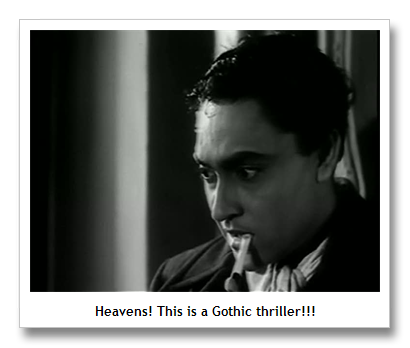
The story begins on a dark and stormy night in Allahabad, in a mansion that looks like it ought to be haunted. Our hero – Hari Shankar (Ashok Kumar) - walks in from the rain, to inspect his newly purchased mansion. The mansion’s caretaker, Mali (Kumar), greets him with the story of a haunting love drama played out here, 40 years ago. The riverside mansion was built for the lovely Kamini whose lover crossed the river to come meet her every night. One night, he was caught in a storm on the river and drowned. But before he perished, he managed to shout to Kamini that he would be back for her in another lifetime. Kamini herself drowned in the river, not long after.

Shankar explores his new domain and discovers a portrait of the previous owner. He is amazed to see that the tragic lover is the spitting image of himself, with a beard and moustache attached! Unlike most Bollywood heroes, Shankar is well versed in masala traditions, and immediately deduces that he must be a reincarnation of the dead man. Right on cue, he hears a female voice singing a haunting melody. He follows the sound to find that the singer is a young beauty (Madhubala) who appears and disappears mysteriously, and sings of her lover’s eventual arrival. A quick reality check via contact with the burning end of his cigarette convinces him that he is not dreaming. His friend Shrinath (Kanu Roy) arrives soon after this and finds him in a disturbed state. He tries to persuade Shankar that the ghostly atmosphere of the mansion has affected him – he is NOT the reincarnation of the male half of the mansion’s tragic lovers and he has NOT found the spirit of the female half.
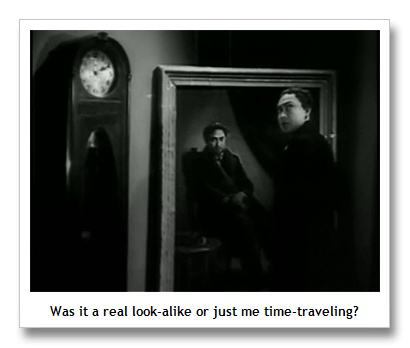
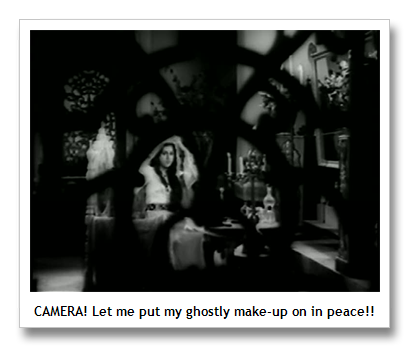

Shrinath’s sensible arguments die an untimely death when the ghostly Kamini (Madhubala) turns up and proves beyond doubt that she is a real, live spirit (if spirits can be said to live). So now Shrinath takes a different tack – Shankar must remember that his life belongs to his betrothed. He convinces Shankar to return home to Kanpur, while he disposes of the poisonous mansion. Shankar starts for Kanpur, but as the train pulls up at Naini, he realises that he should get off it. (I wonder if it’s because he realises that Naini is South East of Allahabad and he needs to go North West to get to Kanpur?) Next thing we know, he is back in the haunted mansion with Kamini-spirit.


The ever vigilant Shrinath rescues him before he can compromise himself with a ghost, but the respite is only temporary. Perceiving that talk of slow poison of the ghostly variety cuts no ice with the now-obsessed Shankar, he decides to give his friend the cure-by-tawaiyaf treatment. Sadly for him, while the cure proved effective in several cases of filmi insanity, it does not so much as dent Shankar’s obsession. He leaves a perfectly good mujra to go home to Kamini’s spirit. And Kamini isn’t slow to respond to his overtures. She tells him that they can be together in this lifetime, if he will only get her the body of a female he might like. When he indignantly refutes any suggestion of liking any female but her, she suggests that he check out caretaker Mali’s daughter, Asha. If he likes her looks, he must kill her so that Kamini-spirit can enter the body and the two lovers can be united.
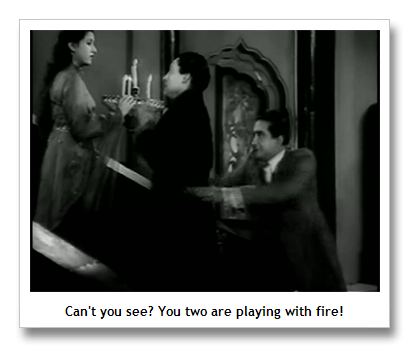


Just when Shankar is all set to kill Asha, Shrinath comes in with the big guns, and that is the end of our hero’s romantic struggle. Shankar is soon married to his fiancée Ranjana (Vijaylakshmi). Defeated he may be, but Shankar is by no means reconciled to his wedded fate. He is unable to get close to his new bride – Kamini is still so much in his thoughts that he can’t even bring himself to unveil his bride and see her face! The incensed Ranjana decides that she will leave her veil on until he lifts it. And so life goes on. Shankar tries in vain to forget Kamini-spirit who sings sad songs of lost love, and poor Ranjana despairs of ever finding out what ails her husband or ever being at the receiving end of his attentions.



I will say no more because I don’t want to spoil the story for those of you who haven’t seen the film yet. As the story unfolds, you realise that things are a whole lot more complicated than you expected, with unusual twists and turns. It’s a very taut, well-told story and confirms to almost every sacred canon of good thriller-making. Right from scene one, it grabs your attention and keeps you on tenterhooks with well-crafted twists as the plot builds up to it’s climax. Unfortunately, the climax is rather disappointing with a great deal of needless melodrama in the last 10 minutes of the film – something that effectively ruins it for me, in spite of Ashok Kumar’s superb performance and the absolutely gorgeous music.

Apart from it’s claim to fame for being one of the first Hindi mystery thrillers, the film is also famous for catapulting Lata Mangeshkar (and Madhubala) into Hindi film world’s big league. So I was not surprised to find that each and every song – and there are many of them - is a gem. I grew up listening to most of them, particularly Aayega aanewaala and Mushkil hai bohut mushkil. What did surprise me, though, was how good the background score was – it was hauntingly beautiful and just right for the plot.
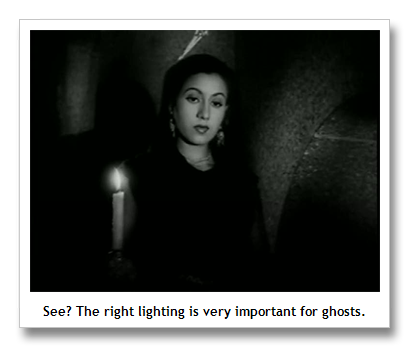
Having said all that, I must admit that Mahal will never make it to a list of my favourite movies, and not just because I dislike the climax. While the plot is very well written and executed, the characters themselves are far from likeable. The three main protagonists come over as rather self-absorbed and three parts insane! The writing makes a commendable effort to show us that Shankar’s experience in the haunted mansion had a profound psychological effect on him, and that everything else is a logical outcome of that, but he still comes over as mentally unstable and ripe for all the drama that follows. By the end, I really did not care whether Shankar, Kamini and Ranjana achieved happiness or not. However, there is no denying that it is a remarkable film, well worth watching for it’s unusual plot, lovely music, great cast, and stunning cinematography. So if you haven’t already seen it, you really should!

Hmmm, it does seem like it's worth watching at least once. Mysteries are always fun, even though the climaxes are almost always disappointing.
ReplyDeleteThis was my first Madhubala movie and my first Ashok Kumar, and there was sooo much to like about it. Spooky ambiance is about my favorite thing in the world, and the music is beautiful. But when I was done watching it, all I could think was, man, that was depressing! For a long time, I associated both actors with a sense of bleak melancholy and ennui. Thank god for "Howrah Bridge"!
ReplyDeleteI will second the positive qualities described in the last paragraph of this post (nicely stated, Bollyviewer), and those are reasons why Mahal is one of my absolute favorites. I would add to that list, also, that I appreciated the way the class issue was nicely woven into the story near the end. I don't think the characters were all that unsympathetic (the female characters were sympathetic to a degree - especially Ranjana), but never mind whether they were likeable or or simply crazy :) , the other qualities in this movie - especially the wonderful music and that great gothic atmosphere (thanks mainly to Kamal Amrohi, the genius who later directed Pakeezah) - made this unquestionably, IMO, a superb film.
ReplyDeleteOf course, I was a something of a goth in my youth, which could explain a lot - as with anarchivist, "spooky ambience" is one of my favorite things.
As for it being depressing... I didn't find it all that depressing, really. It wasn't nearly as much of a downer at the end as a bunch of other '40s films (Mela, Dillagi...), and it's downright cheery compared to some Guru Dutt movies. Depression and melodrama - two more reasons that I love old Bollywood films. :)
Banno, 'fun' is the one thing that is conspicuous by it's absence in this film. There are absolutely no light moments, so the whole film appears dark, even though the "night" scenes are clearly shot in broad daylight!
ReplyDeleteAnarchivist, you should begin watching Dilip Kumar movies - "bleak melancholy and ennui" is his calling card. ;D Thank goodness Madhubala did not get stuck doing similar roles throughout her career!
Richard, I am so tired of class issues in most vintage Hindi films (and real life in India) that their complete absence in this case would've made a bigger impact on me!
The Gothic atmosphere was certainly very well done. I am not particularly fond of it, but here, I liked it. If the last ten minutes had not undone all the good work of the rest of the film, I would've thought this was a perfect film, instead of merely well-made and interesting! I did not find it particularly depressing either - but then I did not particularly care about the characters' fates by the end.
to my utmost despair, I remember the ending of thi smovie, which I last saw some twenty years back, vividly, but can't recall any of the beautiful things before that.
ReplyDeleteJust like I said some days back at Dustedoff's page about 'Aaja re pardesi', 'aayega aanewala' doesn't do me anything. The other songs of the movie are much more pleasant to my ears.
Maybe I should give it a dekho again.
I am so curious - how does the movie end?
ReplyDeleteharvey, one does tend to get tired of popular songs! You might appreciate the other songs in this film, even if Aayega aanawala isn't your thing. I am completely with you on not caring much for Aaja re pardesi. As kids we were accustomed to being woken up in the morning just when the instrumental version of the song was playing on Vividh Bharati. So every time I hear the song, I feel like somebody has switched on an alarm clock and all I want to do is to switch it off!
ReplyDeleteRuchi, here is what happens. (You need to scroll down to see the spoilers for Mahal.)
I love Madhubala paired with Ashok. I just watched "Ek Saal" last night, and was planning to rewatch "Howrah Bridge" and "Mahal." I'm remembering part of the twists but the ending is a little hazy, what really stuck with me was the gothic atmosphere.
ReplyDeleteRichard discussed Mahal a bit on my blog a while back, when I'd written about Madhumati - comparing the two films. It's been too long since I watched Mahal for me to be able to say much about it - either here or on my blog - except that I simply adore Aayega aanewaala. What a fabulous song. Oh, and one very dramatic scene: in court, where the lawyer's called a veiled Madhubala into the witness box and is going on about the impossibility of Shankar having fallen in love with the poor, wretched, ugly daughter of a maali... and then, wham!! - she unveils, and we see what the maali's daughter looks like. :-)
ReplyDeletemyrna-nora Ashok-Madhubala are my favorite pair too and Ek Saal is their best pairing, I think - it certainly is my favorite of their films together. :)
ReplyDeletedustedoff, the court scene was ultra melodramatic. :D Kanu's Roy's shouted defense prompted me to wonder if Justice was deaf as well as blind!
Aayega aanewaala is deservedly famous! I had grown rather tired of hearing it too often, but in the context of this film, it is brilliant, and I love it once again.
I feel almost exactly about this as you do: so many things to like, and yet...it just isn't one I need to see again.
ReplyDeleteExcellently put. The main reason I like the movie is that for its time, the plot was amazingly well done, and rational at a time when superstition was the easy option. Plus the music, of course.
ReplyDeleteBut I think the overwhelming success of its Gothic atmosphere made it too heavy for enjoyment.
i was always about to see thnis but Ashok Kumar as a hero never interested me. but now that yoou say its good, i wil see it. That is also the reason why ive stayed away from Howrah Bridge
ReplyDeleteBollyviewer, another wonderful review. I agree that Mahal is worth seeing for its atmospherics and for the wonderful music; I think my favorite of the many great songs is Ye Raat Phir Na Aayegi. But you're right--it doesn't really hold together.
ReplyDeletememsaab, great minds often do think alike! ;D
ReplyDeleteAKM, I liked that it was steering clear of superstition - but the end was such a big concession to superstition and/or conventions that the film basically squandered all the Brownie points I'd assigned to it for the good parts!
Sharmi, we did grow up watching Dada Mani play the older guy, and for sooooo long, that it feels odd to see him play hero! Do try some of his hero films (I strongly recommend Ek Saal) - you might change your mind! Howrah Bridge isn't as great as the songs lead you to believe - so maybe staying away is not a bad idea.
Pessimississimo, I love Ye raat phir na aayegi - I didn't like it so much in the movie, but when I heard it later (on youtube) it struck me as beautiful in a very understated way.
I saw "Mahal" decades ago and remember being underwhelmed by it. I think it's for the reason you cite - the main characters are INSANE and their battiness gets tiresome after a while.
ReplyDeleteAnd count me as another person who doesn't care for "aayega aanewala" - the prelude is so damn long that I'm fast asleep by the Lata finally gets to the "aayega" part.:-D
OK, well, maybe there's one thing all of us can agree on - we love "Ye Raat Phir Na Aayegi." :) Lata isn't the only fine singer in this film - Rajkumari is fantastic throughout, and Zohrabai is great in this duet with her. And Khemchand Prakash was brilliant too.
ReplyDeleteShalini, if they'd taken time to introduce the characters in their normal habitat before bringing on the spookiness, they might have appeared less batty! As it is, they all seemed to live in Spooksville and give free rein to their insanity...
ReplyDeleteI know what you mean about the long prelude to Aayega aanewala - it is a separate song in itself! It makes me fidgety when I hear the song, but in the film there is quite a bit happening onscreen, so I did not notice the extra-long alaap!
Richard, while I consider Lata Mangeshkar a very fine singer, I prefer almost any of her contemporaries to her! She just does not emote well enough to appeal to me. So certainly we'll agree that Rajkumari and Zohrabai are the other great stars of the film - my post-40s conditioned ears are slowly learning to appreciate them!